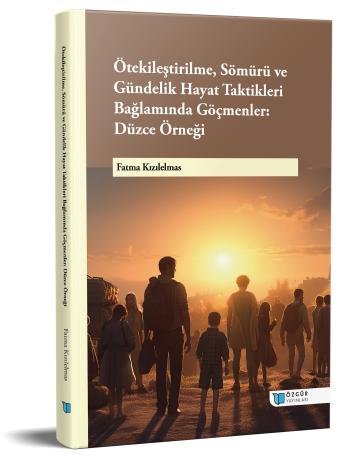
Ötekileştirilme, Sömürü ve Gündelik Hayat Taktikleri Bağlamında Göçmenler: Düzce Örneği
İndir
Özet
Türkiye özellikle 2011 yılından itibaren yaşadıkları iç savaş nedeniyle ülkelerini terk eden Suriye ve Irak kökenli mültecilerin ve yaşadıkları ekonomik sıkıntılar ve siyasî istikrarsızlıklar nedeniyle göç eden İran, Afganistan ve Pakistan kökenli kimselerin sığındıkları bir ülke olmuş ve dünyada en fazla sığınmacı barındıran ülke haline gelmiştir. Ankara ve İstanbul gibi metropol kentlere yakın olan Düzce ilinde tarım, hayvancılık, sanayi, inşaat ve hizmet sektöründe çalışacak iş gücü açığı bulunması, bu şehri iç göçlerin yanı sıra Suriye, Irak ve Afganistan kaynaklı dış göçlerin de yöneldiği ve göçmenlerin çalışmak ve ikamet etmek için tercih ettiği bir yer haline getirmiştir. Göç alan diğer yerler gibi Düzce’ye gelen göçmenler de sığınma amacıyla veya çalışma niyetiyle ya da Avrupa’ya geçmek için geçici olarak kalma gayesiyle gelebilmektedirler. Amaçları ne olursa olsun bu göçmenler hayatlarını devam ettirebilmek için çalışmak zorunda kalmakta ve genellikle enformel sektörlerde vasıfsız olarak, emek yoğun ve düşük ücretli işlerde çalışarak emek sömürüsüne ve ötekileştirilmeye maruz kalmaktadırlar.
Bu çalışma, Türkiye’nin kuzey batısında yer alan Düzce iline sığınma amaçlı göç eden geçici koruma altındaki Suriyeli göçmen erkeklere, uluslararası koruma altında olan Iraklı göçmen erkeklere ve çalışma amaçlı ya da sığınma amaçlı düzenli/düzensiz olarak gelen Afgan göçmen erkeklere ötekileştirme, sömürü ve gündelik hayat taktikleri bağlamında odaklanmaktadır. Bu şekilde bir taraftan Düzce’deki sığınmacı erkeklerin iş bulma sırasında, çalışma hayatlarında ve gündelik hayatlarında yaşadıkları ötekileştirilme ve sömürü ortaya çıkartılırken, diğer taraftan da yaşadıkları zorluklar karşısında onların hayata tutunma taktiklerine, gündelik hayat sosyolojisi kuramları çerçevesinde bakılmaya çalışılmıştır. Bu bağlamda Lefebvre’nin gündelik hayat teorisi, De Certau’nun “gündelik hayatın keşfi”ndeki strateji ve taktik kavramları ve sembolik etkileşimci yaklaşım kuramcılarının görüşleri, yeni toplumsal normlara ve günlük yaşama dair adetlere muhatap kalan düzenli/düzensiz sığınmacıların durumu yorumlanırken dikkate alınmıştır. Ayrıca bulunduğu ve hayatını sürdürdüğü yeri muhtelif sebeplerle terk edip yabancısı olduğu bir mekânda ve ortamda yaşamak durumunda kalan insanları göç etmeye sevk eden sebepler üzerinde durulmuş, göç kararı vermek, göç hareketine dâhil olmak ve varılan yerde yeni bir hayat kurmak sürecinde sığınmacıları etkileyen etmenler ve sığınmacıların karşı karşıya kaldığı tehditler ve fırsatlar tespit edilmeye çalışılmış ve bunlar karşısında sığınmacıların kullandığı taktikler anlatılmıştır.

